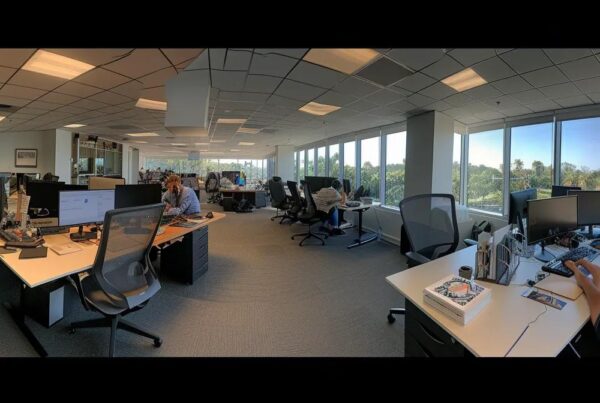Hollywood has a way of turning real-world threats into blockbuster entertainment. We’ve seen it with climate change (hello, The Day After Tomorrow), pandemics (Contagion was a little too accurate), and now — cybersecurity.
Netflix’s Leave the World Behind, directed by Sam Esmail and starring Julia Roberts, and the upcoming Zero Day both center on large-scale cyber threats that throw the country into chaos. But these aren’t just action-packed thrillers with dramatic music and ominous news broadcasts — they tap into something very real: how dependent we are on technology and what happens when it suddenly stops working.
Oh, and did we mention Leave the World Behind was produced by Barack and Michelle Obama? That certainly makes you wonder — does a former U.S. president know something we don’t?
A Cyber Thriller With Presidential Approval?
In Leave the World Behind, a mysterious cyberattack disrupts everyday life in America — no internet, no phone service, no clue what’s happening. It’s eerie because it feels plausible. And with the Obamas behind the project, you can’t help but wonder if the film is more than just entertainment. Maybe it’s a nudge to start taking cybersecurity awareness a little more seriously.
Then there’s Zero Day, where Robert De Niro plays a former president investigating a major cyber threat. The title refers to vulnerabilities that attackers exploit before they’re patched — a real and growing concern in today’s digital world.
Neither of these stories is about aliens or asteroids; they’re about events that could (and sometimes do) happen. That’s what makes them hit a little closer to home. Cybersecurity in Hollywood may dramatize these events, but the lessons they offer are worth considering.
Artificial Intelligence and Cybercrime in Movies
Hollywood is no stranger to exploring the intersection of artificial intelligence and cybercrime. In Leave the World Behind, the reliance on interconnected systems becomes evident, and a cyberattack quickly sends society into turmoil. AI, while revolutionary, also opens up new avenues for cybercriminals to exploit vulnerabilities, conduct sophisticated phishing attacks, or manipulate systems.
With AI-driven cyberattacks on the rise, movies like Zero Day highlight how malicious actors can weaponize technology. This isn’t just science fiction — AI-powered attacks, from deepfakes to autonomous malware, are becoming more common. Businesses should stay vigilant by deploying AI-based security systems that can detect and mitigate threats in real time.
Cyber Threats in Hollywood: Fiction vs. Reality
The glitz and glamour of Hollywood often paint a picture that is glamorous and secure, but behind the scenes, the entertainment industry grapples with a much darker reality when it comes to cybersecurity. Films and TV shows frequently dramatize cyber threats—think of hackers effortlessly breaching multi-million dollar systems, manipulating sensitive data, or even causing chaos through ransomware attacks. While these plots capture the imagination, they tend to exaggerate the capabilities of cybercriminals and simplify the complexities of cyber defense. In reality, while Hollywood may sensationalize these threats, the dangers are not as far-fetched as they might seem. The industry has become a prime target for cyberattacks, with sensitive scripts, personal information of stars, and financial data increasingly at risk.
While Hollywood often amplifies the drama for cinematic effect, the underlying concepts of cyberattacks are rooted in reality. Films like Blackhat and Hackers showcase sophisticated breaches that, while exaggerated, reflect the very real dangers businesses and governments face. These movies bring public attention to the importance of cybersecurity, illustrating the consequences of inadequate defenses.
In reality, cybercriminals are often motivated by financial gain, political agendas, or data theft. Unlike the swift, high-impact attacks seen in movies, real-world breaches can go undetected for months, quietly compromising sensitive data. Businesses should take inspiration from these fictional threats to strengthen their computer security and protect sensitive information.
Hollywood also highlights the role of ethical security professionals, often referred to as white-hat experts. These individuals use their skills to uncover security flaws and assist companies in fixing vulnerabilities before malicious actors can exploit them.
Real Cyber Threats Businesses Face
In today’s fast-paced digital landscape, businesses are increasingly vulnerable to a variety of cyber threats that can jeopardize their operations, reputation, and customer trust. One of the most prevalent threats is ransomware, malicious software that encrypts a company’s data, effectively locking it until a ransom is paid to the attackers. Ransomware attacks have escalated in volume and sophistication, affecting organizations of all sizes across numerous sectors. This can lead not only to immediate financial loss but also to extensive downtime, loss of customer data, and long-term damage to a brand’s credibility.
Another significant threat comes in the form of phishing attacks, where cybercriminals use deceptive emails or messages to trick employees into divulging sensitive information, such as passwords or financial data. These attacks can be highly targeted and often leverage social engineering techniques to seem legitimate, making them difficult to detect. Additionally, businesses must also contend with insider threats, which can arise from employees, contractors, or partners who either intentionally or unintentionally compromise sensitive information. With the rise of remote work and increased reliance on cloud services, companies must strengthen their cybersecurity measures to protect against these multifaceted risks, ensuring that both their data and their customers’ information remain secure.
While Zero Day and Leave the World Behind are fictional representations, the cyber threats they depict are very real. Businesses face various cybersecurity challenges that require proactive defense strategies. Some common threats include:
- Phishing Attacks: Malicious emails designed to trick employees into revealing sensitive information.
- Ransomware: Cybercriminals encrypt business data and demand a ransom for its release.
- Zero-Day Exploits: Attackers take advantage of unpatched software vulnerabilities.
- Insider Threats: Employees or contractors with access to systems may intentionally or accidentally compromise data.
- DDoS Attacks: Overwhelming company servers to cause downtime and disrupt operations.
Recognizing these threats and implementing robust cybersecurity measures is essential for business continuity.
The Real-World Cyber Wake-Up Call
We’re not saying you need to start hoarding canned goods, but these films do highlight how much we take technology for granted. A sudden cyberattack wouldn’t just mean a downed Wi-Fi connection — it could disrupt banking, power grids, transportation, and even emergency services.
The rise of ransomware-as-a-service (RaaS) and the increasing sophistication of cybercriminal groups have made these threats more prevalent. Small and medium-sized businesses (SMBs) are often targeted due to weaker security measures. This makes proactive cybersecurity investment essential, not optional.
But here’s the good news: we’re not helpless. While these movies thrive on worst-case scenarios, the real-world solution is much simpler. Here are some cybersecurity lessons from Hollywood that every business and individual can apply:
- Use strong, unique passwords: Seriously, “123456” is not it.
- Enable multi-factor authentication (MFA): Yes, it adds an extra step but so does getting hacked.
- Be cautious with emails and links: That “urgent” request from your bank? Probably not real.
- Keep software updated: Hackers love outdated systems.
- Have backups: Because losing everything to ransomware is not fun.
- Perform regular security audits: Identify and mitigate vulnerabilities before they’re exploited.
- Train employees on cybersecurity best practices: A well-informed workforce is one of the best defenses.
Looking to Improve Your Cybersecurity?
Not worried — aware. If Hollywood is making movies about cyber threats and even former presidents are involved, maybe it’s time to stop thinking of cybersecurity as just an IT issue and more as an everyday necessity.
And while these movies may lean into the dramatics, they serve as a reminder that our reliance on digital systems requires us to stay vigilant. From strengthening passwords to building incident response plans, we all have a role in ensuring cybersecurity.
Because at the end of the day, we all love a good thriller… as long as it stays on Netflix and not in real life.
Looking to improve your company’s cybersecurity strategy? iTech Support offers comprehensive cybersecurity awareness training and solutions to keep your business protected. Learn more about our cybersecurity services today!








